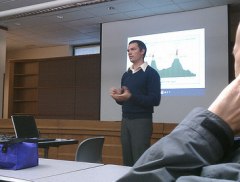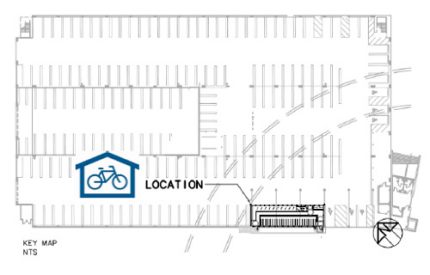[Contributor Michael Andersen is the editor of Portland Afoot, a forthcoming “10-minute newsmagazine” and wiki about low-car life in Portland, especially TriMet riders. Their launch issue comes out June 1.]

(Photo: Michael Andersen)
Three years into a quest to go beyond bike lockers, TriMet is about to build what it hopes will be the next generation of 24-hour bike storage at the Sunset Transit Center in Beaverton.
Yesterday, TriMet bicycle planner Colin Maher told a small crowd at PBOT’s Bicycle Brown Bag discussion that, “Bike lockers are great, if you have one. And that’s the trouble.”
TriMet’s solution, modeled on the Berkeley-based BikeLink system, is to set up a card-based, pay-to-park system for commuters who want to keep their bikes safe without committing to a six-month, $25 locker rental.
“The reason you’re charging for bikes is you’ve got a security system here – you’re paying for that support. If you don’t want to pay, there’s always bike racks outside.”
— Colin Maher, TriMet
This is all part of the regional transit agency’s effort –- kicked off during the 2008 gas price spike – to cut the crush of bikes on rush-hour MAX trains. They’ve almost doubled the number of bike lockers since, but the number of renters hasn’t risen. Last month, TriMet’s Citizen Advisory Committee said the agency should “invest less in park and ride lots and more in bike storage” to free up room on trains, especially for wheelchairs.
Secure bike parking at Sunset Transit Center’s new 75-bike cage, Maher said, will cost 3 cents an hour during the day, 1 cent an hour on nights and weekends. (Yep, that’d be about $2.50 for one week straight.)
The $185,000 project at Sunset TC comes from last year’s federal stimulus act. Construction starts mid-June; it’s supposed to be ready to use in mid-July.
Maher said the daytime rate might rise if the cage gets too crowded, but he expects overnight bike parking to remain inexpensive. “We’d like to use the pricing to encourage people to leave bikes overnight, which is what about 15 percent of bike-locker renters are doing right now,” Maher said.
Riders will pay for use of the cages with a new “smart card” system: Each renter will get a personalized card that checks his or her bike in or out of the facility and tracks the time their vehicle spent inside.

Renters get their cards at an ATM-like machine in the transit center. After that, adding cash to the cards will be fully automated (check these videos from BikeLink for more on how it will work).
Riders don’t have to use the cage if they don’t want to pay – or if they’re annoyed, as city planner Ellen Vanderslice seemed to be during Thursday’s meeting, that the park-and-ride will remain free for cars.
“The reason you’re charging for bikes is you’ve got a security system here – you’re paying for that support,” Maher said. “If you don’t want to pay, there’s always bike racks outside.”
TriMet’s new bike parking cards will also be used in two other new bike-parking facilities: Beaverton Transit Center’s new 100-bike garage and another cage at Gresham Central Transit Center.
Both of those are due to start and finish construction this September, Maher said.
So, is this the future of the suburban park and ride? Could it be the future of the urban parking garage?
Well, it sure is cheap – especially if it convinces a few dozen people who live within a mile or two of the park-and-ride to leave their cars at home. That’s because free auto parking is really, really expensive to taxpayers. The Sunset TC bike cage will replace eight auto spaces with 75 bike spaces, so if it fills up, it’ll have cost just $2,500 per person to build. That’s one-third of the $7,500 the public has to pay for a car-sized space in a parking lot, one-sixth of the $15,000 we pay for a car-sized space in a parking garage.
The catch, of course, will be filling up the bike cage. If 500 Beaverton car users roll past a nearly-empty bike cage while searching for parking spots of their own every morning, they’ll start to clamor to reclaim some of those eight spots.
Maher is confident that easy-pay bike parking is something Washington County wants. “I think the timing is right on this to get it full by the end of the summer,” Maher said. “The bike racks we have right now are full, so we don’t know how much demand is out there.”

